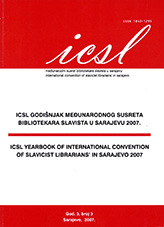Digitalna tranzicija i bibliotečki prijepori identiteta
Digital Transition and Librarian Contestations of Identity
Author(s): Mario HibertSubject(s): Cultural Essay, Political Essay, Societal Essay
Published by: IK ''MAGISTRAT'' d.o.o. Sarajevo
Summary/Abstract: Networked society as a virtual crossroad of economic, political, social and cultural spheres, paved the way to the democratization of knowledge. For librarians such paradigm shift means adjustment to the expansion of information and communication technology but at the same time disclosure of the professional concerns regarding suppositions of civil society, civic freedom and digital divide that interfere with the problems concerning access to information commons and respectively, information and communication rights. Librarians/information specialists have duty and responsibility to ensure enjoyment of free access to information simultaneously bearing in mind their ethical and professional accountability since they are those whose unbiased attitude and nondiscriminatory judgments should provide access to organized repositories of knowledge regardless of its origin. On the other side, libraries face with tasks of inclusive policy development that could bridge the digital divide and lead to integration of what is called: information society. Importance of promotion and encouragement of intercultural dialogue on the basis of consistent recognition of different cultural values of information as well as emphasizing of valuable interference of librarianship with the human rights presume understanding of necessity to acquire new skills to deliver knowledge to the users. Access to knowledge is the cornerstone of the open society in which individual potentials could be realized only if functional democratic environment based on principles of fairness and equal opportunity. New social model aims to advance active participation in new information order that stands on global information and communication infrastructure therefore exploring issues that pertain to information ethic and information politics are key moments for articulation, actualization and reexamination of the art of refereeing to knowledge in digital age that leads us to necessity of understanding the complexity of library and information science.
Journal: ICSL - GODIŠNJAK MEĐUNARODNOG SUSRETA BIBLIOTEKARA SLAVISTA U SARAJEVU
- Issue Year: 2007
- Issue No: 3
- Page Range: 116-130
- Page Count: 15
- Language: Bosnian

